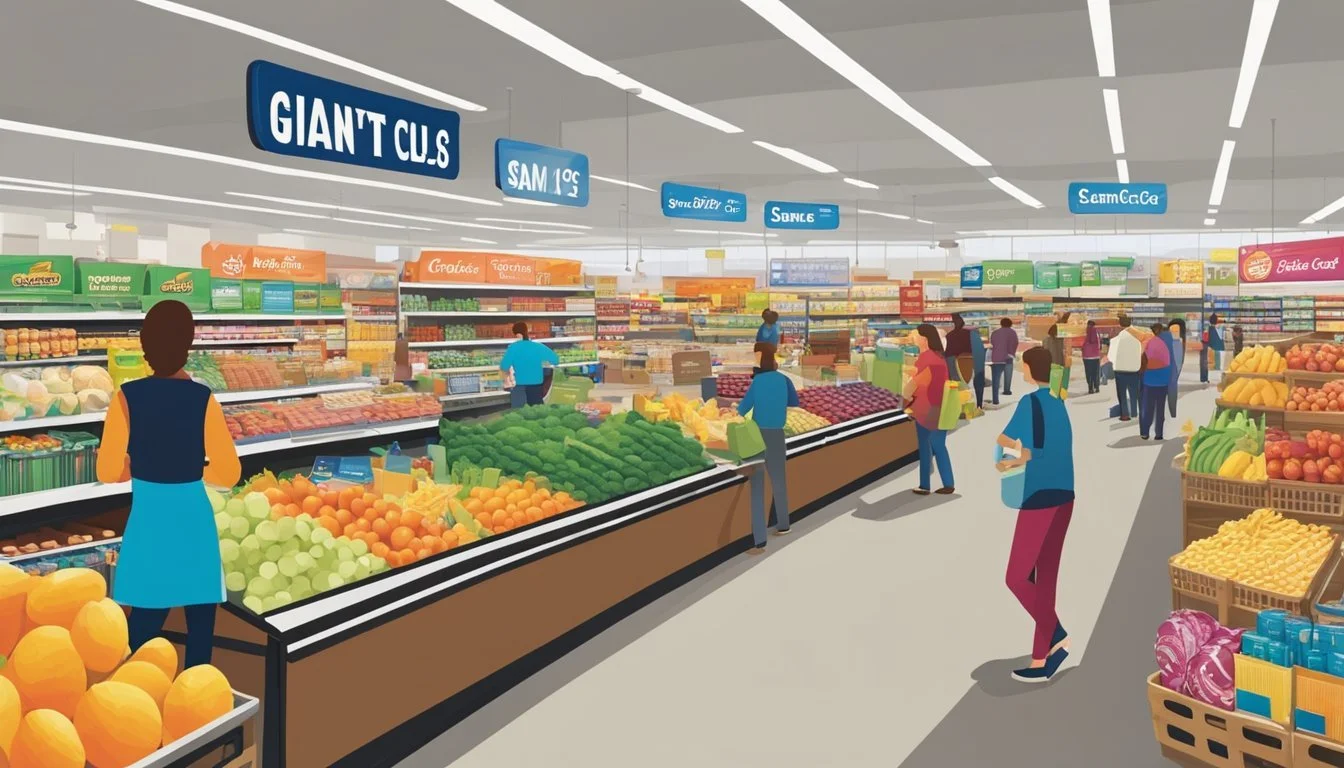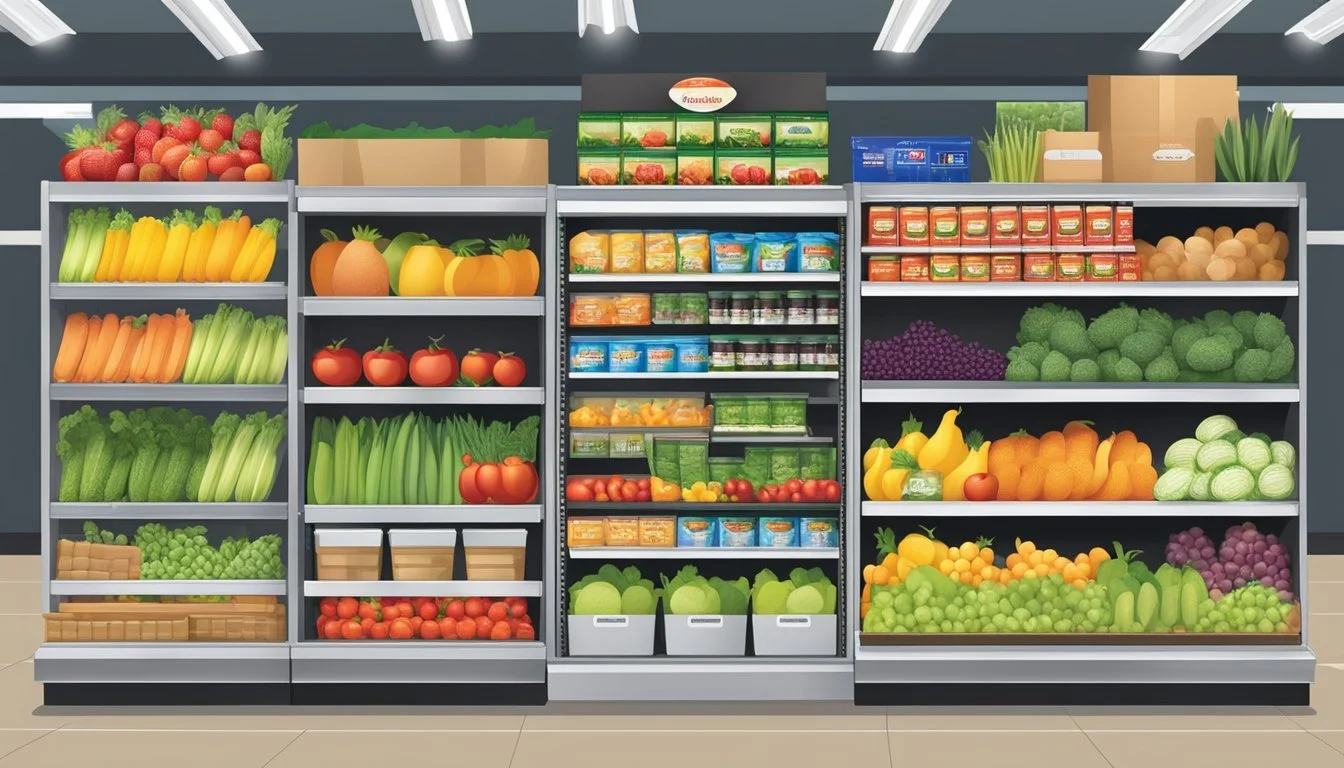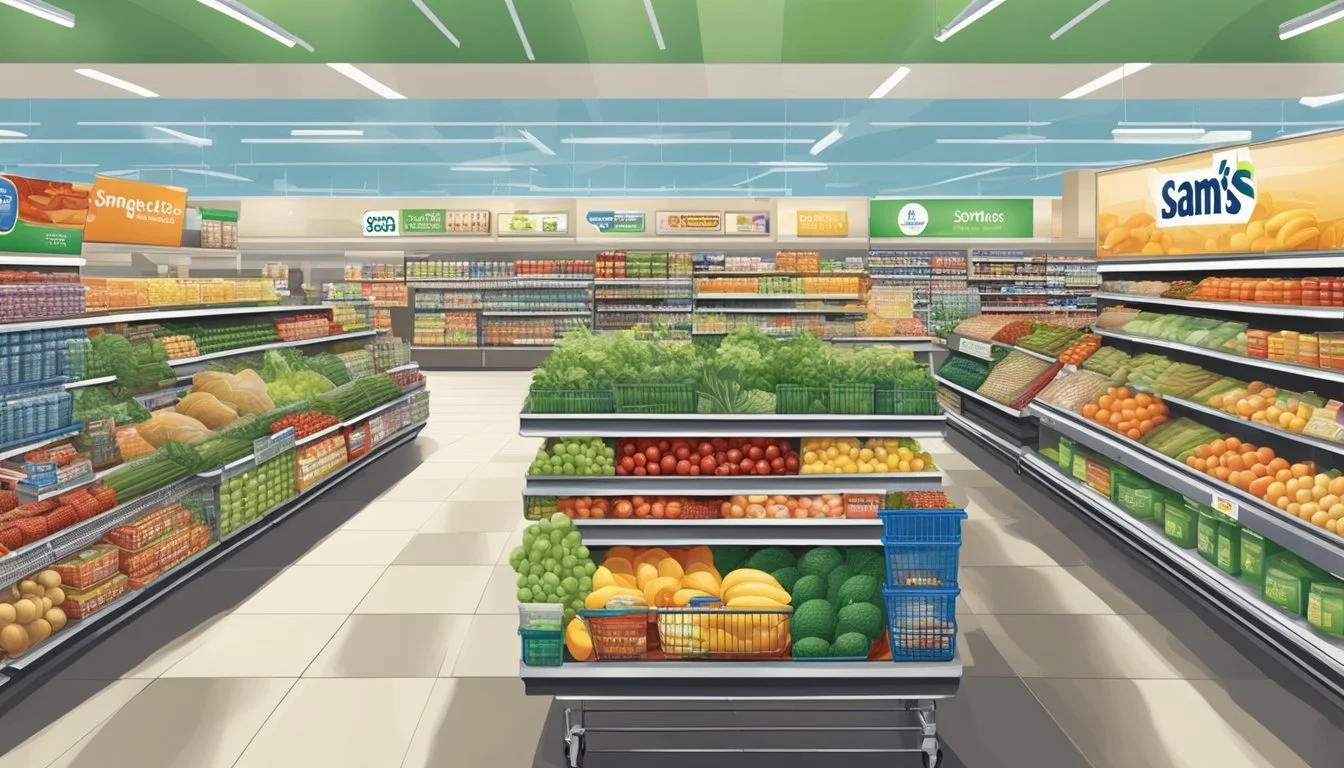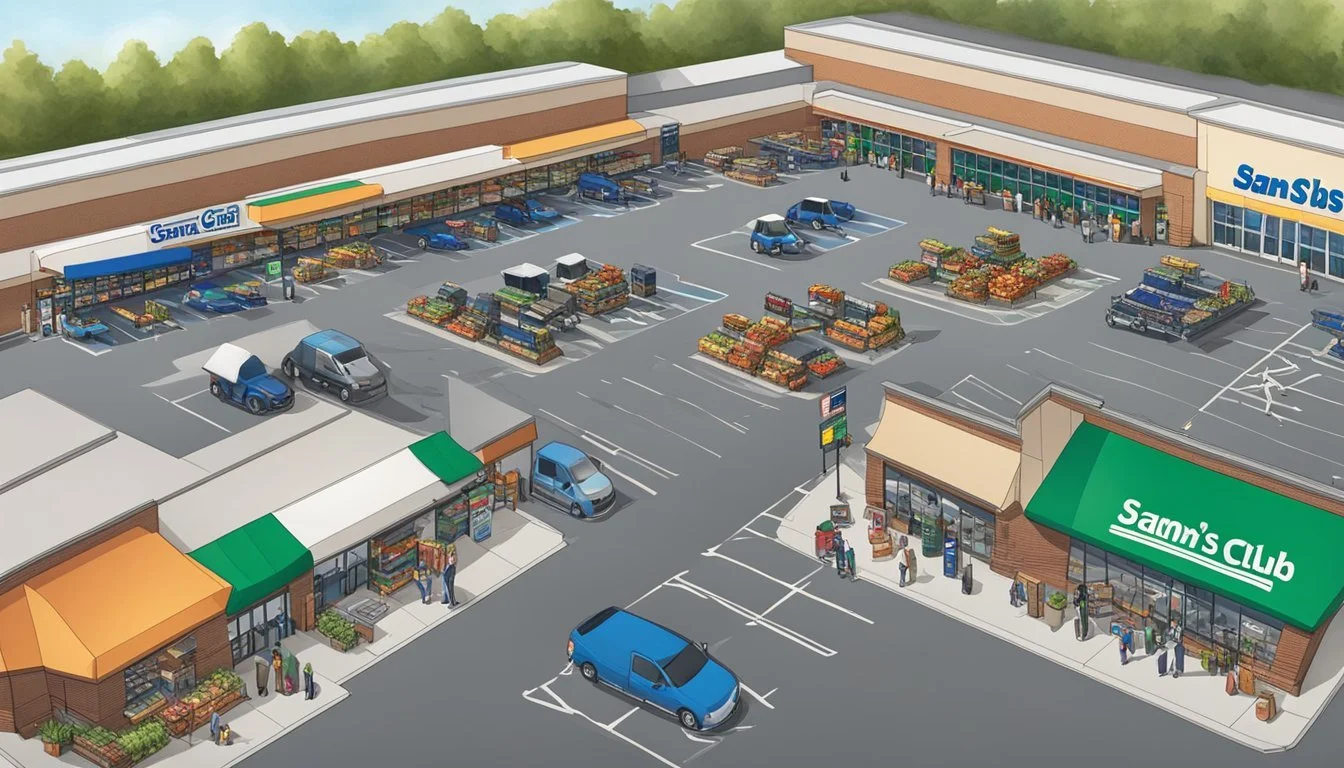Giant Food vs Sam's Club
A Comprehensive Comparison of Price, Quality, and Selection
Giant Food and Sam's Club are two prominent grocery retailers in the United States, each offering distinct shopping experiences for consumers. Giant Food operates as a traditional supermarket chain, providing a wide range of products and services to customers in the Mid-Atlantic region. Sam's Club, on the other hand, is a membership-based warehouse club known for its bulk offerings and discounted prices.
When comparing these two grocery options, Sam's Club tends to offer lower prices on many items, especially when purchasing in larger quantities. This pricing advantage stems from Sam's Club's connection to Walmart, which grants access to significant buying power. However, Giant Food may be more convenient for everyday shopping needs, with a greater number of locations and a focus on fresh produce, deli items, and local products.
The choice between Giant Food and Sam's Club often depends on individual shopping preferences and needs. Families or businesses that frequently buy in bulk may find Sam's Club more cost-effective, while those seeking a traditional supermarket experience with a wider variety of brands and smaller package sizes might prefer Giant Food. Both stores strive to meet the diverse needs of American consumers in the competitive grocery market.
Company Backgrounds
Giant Food and Sam's Club are two prominent retailers in the United States grocery landscape. Both have unique histories and business models that have shaped their current market positions.
History of Giant Food
Giant Food was founded in 1936 by N.M. Cohen and Samuel Lehrman in Washington, D.C. The company started as a small grocery store and expanded rapidly throughout the mid-Atlantic region. In the 1950s, Giant pioneered the concept of combination food and pharmacy stores, setting a trend in the industry.
Giant Food grew to become a major supermarket chain in the Northeast, known for its wide product selection and customer service. In 1998, Dutch company Royal Ahold acquired Giant, leading to further expansion and modernization efforts.
Today, Giant Food operates over 160 stores across Maryland, Virginia, Delaware, and Washington, D.C. The company has embraced digital initiatives and sustainability practices to stay competitive in the evolving retail market.
Overview of Sam's Club
Sam's Club, a division of Walmart Inc., was established in 1983 by Walmart founder Sam Walton. The company operates as a membership-only warehouse club, offering bulk products at discounted prices.
Sam's Club rapidly expanded across the United States, leveraging Walmart's extensive supply chain and purchasing power. The retailer caters to both individual consumers and businesses, providing a wide range of products from groceries to electronics.
With nearly 600 locations nationwide, Sam's Club has become a major player in the wholesale retail sector. The company has invested heavily in e-commerce capabilities and data analytics to enhance its customer experience and compete with other warehouse clubs.
Sam's Club's business model focuses on offering significant discounts through bulk purchases and limited product selection. This approach has helped the company maintain a strong market position and loyal customer base.
Store Brand and Product Range
Giant Food and Sam's Club offer distinct store brand products and product ranges. Both retailers provide unique private label options and diverse selections to cater to different customer needs.
Giant's Private Label Offerings
Giant Food's store brand, "Giant," covers a wide array of grocery items. The line includes everyday essentials like bread, milk, and eggs, as well as specialty products. Giant also offers organic options under its Nature's Promise label.
Giant's private label products aim to provide quality comparable to national brands at lower prices. Many items are sourced locally when possible, supporting regional producers.
The retailer frequently introduces new Giant-branded products based on consumer trends and feedback. This approach allows them to stay competitive and meet evolving customer preferences.
Sam's Club Exclusive Brands
Sam's Club features its Member's Mark brand across numerous product categories. This private label covers groceries, household items, and even some electronics and furniture.
Member's Mark products are often sold in bulk quantities, aligning with Sam's Club's warehouse model. The brand emphasizes value without compromising quality.
Sam's Club regularly tests and refines its Member's Mark offerings. They conduct taste tests and quality checks to ensure products meet or exceed standards set by national brands.
Comparison of Product Selection
Giant Food typically offers a broader range of individual products compared to Sam's Club. Its traditional supermarket format allows for greater variety in brands and package sizes.
Sam's Club focuses on bulk quantities and limited SKUs. While the selection may be smaller, the products available are carefully curated for member preferences.
Giant excels in fresh produce variety and specialty foods. Sam's Club stands out in bulk pantry staples and frozen goods.
Both retailers provide organic options, but Giant usually offers more choices in this category. Sam's Club compensates with larger package sizes for popular organic items.
Giant's selection caters to daily shopping needs. Sam's Club's range is ideal for stocking up or buying for large families or businesses.
Price Analysis
Giant Food and Sam's Club offer distinct pricing structures and savings opportunities. Their approaches to cost-effectiveness, bulk discounts, and membership benefits impact overall value for shoppers.
Giant Food Cost Effectiveness
Giant Food employs competitive pricing on everyday grocery items. The store frequently runs sales and promotions to attract budget-conscious shoppers. Giant's loyalty program provides additional discounts and personalized offers.
Store-brand products often cost less than national brands, offering savings without sacrificing quality. Giant's weekly circular highlights special deals, allowing customers to plan purchases around sales.
Fresh produce and meat prices at Giant Food tend to be in line with other traditional supermarkets. The store's price-matching policy helps ensure customers get the best local deals.
Sam's Club Savings Breakdown
Sam's Club leverages bulk purchasing to offer lower prices on many items. Members can save significantly on non-perishable goods, household supplies, and certain fresh foods.
The warehouse store excels in value for large families or businesses buying in quantity. Sam's Club's private label, Member's Mark, provides quality products at competitive prices.
Savings vary by product category. Electronics, tires, and prescription medications often have substantial discounts. Grocery staples like milk, eggs, and bread are competitively priced but may not always beat local supermarket sales.
Membership Costs and Benefits
Sam's Club requires a membership fee, starting at $45 annually for a basic membership. The Plus membership, at $100 per year, offers additional perks like free shipping and early shopping hours.
Members receive exclusive access to fuel savings, optical services, and pharmacy discounts. Sam's Club credit card holders earn cash back on purchases, potentially offsetting the membership cost.
Giant Food does not charge a membership fee. Their loyalty program is free to join and provides digital coupons, gas rewards, and personalized offers. While lacking the bulk savings of Sam's Club, Giant's no-fee model appeals to shoppers who prefer flexibility.
Quality of Products
Giant Food and Sam's Club offer distinct product quality standards. Both stores aim to provide fresh, high-quality items to their customers, but their approaches and specialties differ.
Fresh Produce and Organic Offerings
Giant Food emphasizes a wide selection of fresh produce, including many organic options. Their produce departments feature locally-sourced fruits and vegetables when available. Sam's Club, as a bulk retailer, offers larger quantities of produce at competitive prices.
Giant Food's organic selection is more extensive, catering to health-conscious consumers. They stock a variety of organic fruits, vegetables, and herbs. Sam's Club has increased its organic offerings in recent years but still lags behind Giant Food in this category.
Both stores implement quality control measures to ensure freshness. Giant Food rotates stock frequently, while Sam's Club's high turnover helps maintain produce quality despite larger quantities.
Meat and Seafood Standards
Giant Food typically provides a broader selection of meat cuts and seafood options. They often feature a dedicated butcher counter and fresh seafood department. Sam's Club focuses on bulk packages of popular meat cuts and frozen seafood.
Giant Food sources meat from various suppliers, including some local farms. They offer antibiotic-free and organic meat options. Sam's Club's meat is generally high-quality but comes from larger suppliers.
Both stores maintain strict food safety standards. Giant Food's seafood department often includes sustainably sourced options, while Sam's Club offers good value on frozen seafood in larger quantities.
Bakery and Dairy Comparisons
Giant Food usually has an in-store bakery producing fresh bread, cakes, and pastries daily. They offer a mix of artisanal and mass-produced baked goods. Sam's Club's bakery focuses on larger-format items like sheet cakes and bulk bread packages.
In the dairy section, Giant Food provides a wider variety of brands and specialty items. They stock local dairy products and alternatives like plant-based milk. Sam's Club offers good value on staple dairy items in larger sizes.
Both stores maintain high standards for dairy freshness. Giant Food rotates stock frequently, while Sam's Club's rapid turnover ensures products don't linger on shelves.
Shopping Experience
Giant Food and Sam's Club offer distinct shopping environments tailored to different customer needs. Their approaches to services, layout, and customer interactions shape unique experiences for shoppers.
In-Store Services and Amenities
Giant Food provides a range of in-store services to enhance convenience. Shoppers can access pharmacy services, floral departments, and deli counters. Many locations feature Starbucks cafes, allowing customers to grab a coffee while shopping.
Sam's Club, as a membership-based warehouse, offers bulk purchases and additional perks. Members can take advantage of optical centers, hearing aid services, and tire centers. The store also provides free tire rotation and battery testing for members.
Both chains have self-checkout options to speed up the purchase process. However, Sam's Club takes it a step further with Scan & Go technology, enabling members to scan items with their smartphones as they shop.
Online Shopping and Curbside Pickup
Giant Food and Sam's Club have embraced digital solutions to improve shopping convenience. Both offer online ordering platforms and mobile apps for easy browsing and purchasing.
Giant Food's curbside pickup service allows customers to order groceries online and collect them at designated times. The store often provides same-day pickup options for added flexibility.
Sam's Club offers a similar curbside pickup service called Club Pickup. Members can place orders through the app or website and collect their items without entering the store. Some locations even provide drive-thru pickup for added convenience.
Both retailers have invested in delivery services, partnering with third-party providers to bring groceries directly to customers' homes.
Store Layout and Cleanliness
Giant Food stores typically feature a traditional supermarket layout. Produce sections are often near the entrance, with clearly marked aisles for different product categories. The stores maintain a clean appearance with regular aisle tidying and floor cleaning.
Sam's Club adopts a warehouse-style layout with wide aisles and high shelves. Products are often displayed on pallets or in bulk packaging. The open floor plan allows for easy navigation of large shopping carts.
Cleanliness standards are high in both stores, with staff regularly maintaining restrooms and common areas. Sam's Club's concrete floors are designed for durability and easy cleaning in high-traffic areas.
Customer Service
Giant Food emphasizes personalized customer service. Staff members are often available throughout the store to assist with product locations or answer questions. The chain typically maintains dedicated customer service desks for returns and inquiries.
Sam's Club focuses on efficiency in customer interactions. Membership associates are available to help with account-related issues. The store's layout and signage are designed to promote self-service, with staff available when needed.
Both retailers offer loyalty programs. Giant Food's program provides personalized deals and gas points, while Sam's Club membership includes access to exclusive discounts and services.
Return policies differ, with Giant Food generally allowing returns with receipts within a reasonable timeframe. Sam's Club offers a more generous policy, often accepting returns without time limits for most items.
Consumer Perception and Trust
Customer perception and trust play crucial roles in the success of grocery retailers. Both Giant Food and Sam's Club have cultivated distinct reputations among shoppers based on factors like product quality, pricing, and overall shopping experience.
Customer Satisfaction Surveys
Consumer Reports regularly conducts surveys to assess customer satisfaction with grocery stores. In recent rankings, Sam's Club has consistently outperformed many traditional supermarkets. The warehouse club scored well for competitive pricing and bulk purchasing options.
Giant Food, while not typically ranking at the top, maintains a solid reputation in its operating regions. Customers appreciate its familiar neighborhood presence and loyalty program benefits.
Both stores face challenges in certain areas. Sam's Club's membership model can be a deterrent for some shoppers. Giant Food sometimes struggles with perception of higher prices compared to discount chains.
Brand Loyalty and Reputation
Sam's Club benefits from its association with parent company Walmart's immense buying power. This connection allows it to offer consistently low prices, building trust with budget-conscious consumers.
Giant Food has cultivated strong regional loyalty, particularly in the Mid-Atlantic states. Its long history in local communities contributes to a sense of familiarity and reliability for many shoppers.
Brand reputation also stems from product quality perceptions. Sam's Club is known for its extensive selection of name-brand items at discounted prices. Giant Food emphasizes its fresh produce and in-house brands.
Customer service plays a role in shaping loyalty. Giant Food's smaller store format allows for more personalized interactions. Sam's Club focuses on efficiency and self-service to keep costs down.
Comparative Advantages
Giant Food and Sam's Club offer distinct shopping experiences with unique benefits. Their approaches to bulk purchasing, product selection, and customer services set them apart in the competitive grocery market.
Bulk Purchase Benefits
Sam's Club excels in bulk purchasing options. Members can buy large quantities of products at discounted prices. This is particularly advantageous for families, small businesses, and organizations.
Giant Food, while not a warehouse club, offers bulk options on select items. Their loyalty program provides discounts on larger purchases. Sam's Club's national brand selection in bulk is typically more extensive.
Both stores carry their own store brands. Sam's Club's Member's Mark covers a wide range of products, often at lower prices than national brands. Giant Food's store brands provide quality alternatives at competitive prices.
Unique Features and Services
Sam's Club offers a popular rotisserie chicken, often priced lower than competitors. Their optical and pharmacy services are additional perks for members.
Giant Food provides a more traditional grocery shopping experience. They often have in-store pharmacies and some locations feature on-site banking services.
Sam's Club requires a membership fee, which can be offset by savings for frequent shoppers. Giant Food is open to all customers without membership requirements.
Giant Food typically offers a wider variety of fresh produce and specialty items. Sam's Club focuses on bulk staples and household goods.
Location and Accessibility
Sam's Club and Giant Food differ significantly in their geographic reach and store locations. These factors impact how convenient each retailer is for shoppers in different regions.
Geographic Footprint and Expansion
Sam's Club boasts over 600 locations across the United States and Puerto Rico. The warehouse club chain benefits from its parent company Walmart's extensive distribution network. Giant Food operates approximately 165 stores, primarily concentrated in the Mid-Atlantic region. This regional focus allows Giant to cater to local preferences but limits its availability to consumers outside its core markets.
Convenience and Travel Distance
Sam's Club stores are typically located in suburban areas with ample parking. Many Sam's Club locations are situated near Walmart Supercenters, creating convenient one-stop shopping destinations. Giant Food stores are often found in both urban and suburban settings, with a mix of larger supermarkets and smaller neighborhood locations. This varied approach can reduce travel times for Giant shoppers in densely populated areas.
Travel distance to each store type varies by region. In areas where both chains operate, consumers may find a Giant Food closer to home for quick trips, while Sam's Club might require a longer drive but offer bulk purchasing options.
Sustainability and Ethical Practices
Giant Food and Sam's Club have implemented various sustainability initiatives and ethical practices. Both retailers aim to reduce their environmental impact and improve animal welfare standards in their supply chains.
Eco-Friendly Initiatives
Giant Food has introduced reusable bag programs and energy-efficient lighting in stores. The company focuses on reducing food waste through partnerships with local food banks. They offer a wide selection of organic products to promote sustainable agriculture.
Sam's Club, as part of Walmart, has made significant strides in sustainability. They've deployed advanced food waste management systems in over 1,400 stores. This technology helps reduce organic waste sent to landfills. Sam's Club also emphasizes energy-efficient operations and packaging reduction efforts.
Animal Welfare and Sourcing
Giant Food prioritizes animal welfare in its sourcing practices. They offer cage-free eggs and have committed to sourcing pork from suppliers who don't use gestation crates. The company provides grass-fed beef options and antibiotic-free poultry to meet consumer demand for ethically-sourced products.
Sam's Club has taken steps to improve animal welfare standards. They've removed certain ingredients from their Member's Mark private label products. The company works with suppliers to ensure humane treatment of animals. Sam's Club offers organic meat options and has increased its selection of antibiotic-free products.
Both retailers continue to expand their organic and sustainably-sourced product offerings to meet growing consumer demand for healthier, more ethical food choices.
Looking Ahead
Giant Food and Sam's Club continue to adapt to changing consumer needs and industry trends. Both retailers are embracing technology and sustainability initiatives to stay competitive in the evolving grocery landscape.
Future Plans and Industry Trends
Giant Food is investing heavily in e-commerce capabilities, expanding its Giant Delivers service to reach more customers. The supermarket chain plans to open several new smaller-format urban stores to cater to city dwellers.
Sam's Club is focusing on enhancing its mobile app experience and scan-and-go technology. The warehouse retailer aims to increase its private label offerings under the Member's Mark brand.
Both companies are prioritizing sustainability efforts. Giant Food is working to reduce food waste and plastic usage in its stores. Sam's Club is transitioning to more eco-friendly packaging for its private label products.
Automation is another key area of development. Giant Food is testing cashierless checkout systems, while Sam's Club is expanding its use of inventory robots to improve efficiency.








